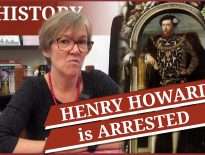On this day in Tudor history, 3rd December 1536, a proclamation was made to the rebels of the Pilgrimage of Grace offering them a pardon.
Yes, Henry VIII was offering the rebels "free pardons" for their rebellion against him, his advisors and his religious measures.
In today's "on this day in Tudor history", I give a reminder of what the Pilgrimage of Grace rebellion was about and how, even though a free pardon was offered, prominent rebels ended up being executed.
You can find out more about the rebellion in my video from 4th October, which I've put underneath.
Also on this day in history:
- 1577 – Death or burial of William Downham, Bishop of Chester and former chaplain of Elizabeth I before her accession. He was buried in the choir of Chester Cathedral.
- 1600 – Death of Roger North, 2nd Baron North, peer and politician in Elizabeth I's reign, at his London home in Charterhouse Square. He was given a funeral service at St Paul's, followed by a burial at Kirtling in Cambridgeshire. North was a friend of Robert Dudley, Earl of Leicester, and served Elizabeth I as Privy Councillor and Treasurer of the Household.
Transcript:
On this day in Tudor history, 3rd December 1536, a proclamation was made to the rebels of the Pilgrimage of Grace offering them a pardon. It read:
“Proclamation of the King’s pardon to the rebels of the different districts, viz.: That those of Yorkshire, with the city of York, Kingston upon Hull, Marshland, Holdenshire, Hexham, Beverley, Holderness, &c., on their submission to Charles duke of Suffolk, president of the council and lieutenant general in Lincolnshire, at Lincoln or elsewhere that he may appoint, shall have free pardons granted to them under the Great Seal without further bill or warrant or paying anything for the Great Seal. Richmond, 3 Dec., 28 Henry VIII.
The same proclamation was also made in “Northumberland, Cumberland, Westmoreland, York, city of York, bishopric of Durham, &c., and in the parts north of Lancaster, on their submission to Henry earl of Cumberland”.
The Pilgrimage of Grace rebellion was an uprising in the North which was sparked off initially by trouble in Lincolnshire which occurred after a sermon was preached on 1st October 1536 in which a vicar “affirmed that the church or its faith, or both, were in danger”. There was also discontent over the dissolution of monastic properties, the government commissions in the area, and rumours that these commissions would confiscate jewels and plate from churches and impose new taxes. The rebels’ grievances, which were dispatched to the king, also included “the introduction into the king’s council of Cromwell, Rich, and other ‘such personages as be of low birth and small reputation'” and the promotions of men in the church who had “”subverted the faith of Christ”.
Henry VIII did not give in to the rebels’ demands and eventually, when it was clear that the rebels were outnumbered by the Crown’s forces, rebel leader Robert Aske chose to negotiate. In November 1536, a deal was eventually struck with the Duke of Norfolk giving promises from Henry VIII that the people’s demands would be met and that they would be pardoned. Aske then dismissed his troops.
This was followed by the proclamation on this day in history, 3rd December 1536, and the king also consented to the rebels’ demand for a free Parliament to be held at York. The rebellion dispersed, but was followed by another rebellion led by Sir Francis Bigod in Yorkshire in early 1537. Robert Aske tried to prevent it but Bigod went ahead. Bigod’s Rebellion failed and Bigod was arrested. Robert Aske and other men involved in the Pilgrimage of Grace rebellion – such as Lord Darcy, Thomas Percy and Robert Constable – were arrested, convicted of treason and executed.



Leave a Reply